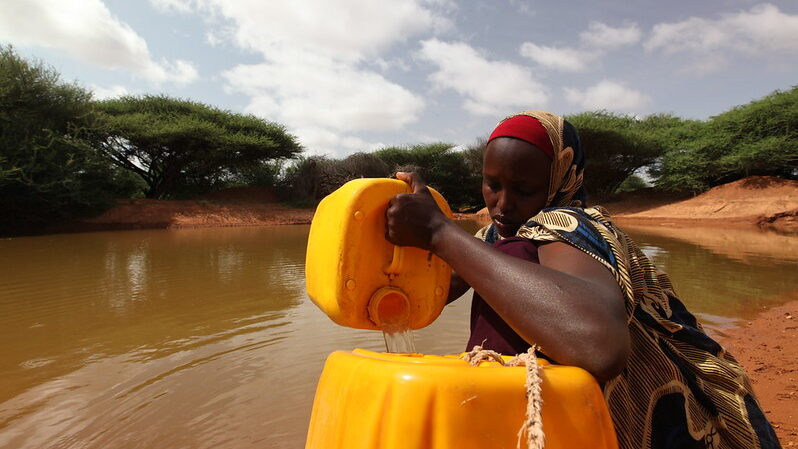Mattias Söderberg is global climate lead at DanChurchAid and Grace Mbungu is senior fellow for climate adaptation at the Africa-Europe Foundation.
Denmark now has the EU presidency, and there is a busy climate agenda ahead.
Aside from the internal challenge to reach an agreement on the EU position at the upcoming COP30 climate summit in Brazil, and the 7th African Union-European Union Heads of State Summit in Angola, Denmark will also drive the diplomatic outreach, balancing geopolitical, trade and security concerns. As such, the Danish EU Presidency will certainly be difficult; we argue it also presents a unique opportunity, which should be seized.
COP30 and the AU-EU summit in November provide possibilities for the EU to deepen its partnership with Africa, one of the continents most vulnerable to climate change impacts and risks – despite contributing minimally to current and historical global emissions.
Global goal for clean cooking by 2030 out of Africa’s reach, IEA says
Africa’s climate reality is stark: frequent droughts, devastating floods, and rising temperatures threaten food and water availability, health, economic growth, social stability, and regional security. These impacts undermine human development gains and future economic prospects across the continent.
Yet, Africa’s contribution to greenhouse gas emissions remains small compared to Europe’s historical and current footprint. This asymmetry calls for a climate partnership rooted in justice, equity, and solidarity.
At the same time, the lack of trust and divergent priorities and visions between the continents are significant. African governments are still frustrated about the disappointing outcome from COP29 and the latest climate talks in Bonn, and the EU is worried about rising geopolitical tensions, where EU-Africa collaboration becomes crucial.
New adaptation finance goal needed
We hear that adaptation will become a prioritised topic at COP30, as well as the upcoming second Africa Climate Summit in September. The AU-EU leaders’ meeting also offers a platform for both continents to articulate shared priorities and commitments to increase the focus on adaptation.
The EU must seize this moment to scale up support for climate adaptation in Africa, recognizing adaptation action and finance as equally urgent and important as mitigation.
This has long been a key call from African countries, and COP30 should be the venue where the EU commits to a new, ambitious adaptation finance goal that goes beyond the current pledge to double adaptation finance by 2025 compared to 2019.
Brazil offers COP30 cruise ship rooms and cost caps, but negotiators remain unhappy
Given the rapidly escalating climate impacts, drastically scaling up adaptation finance, and easing delivery and access are essential to meet growing needs and close the glaring finance gap. Currently, around 32% of climate finance reaching Africa goes towards adaptation, this figure being itself limited to 2-4% of global climate finance.
Moreover, adaptation finance must be accessible, predictable, and tailored to local needs and priorities. Many African countries face high debt burdens, limiting their fiscal space to invest in resilience.
The EU should therefore prioritize mobilizing grants and concessional financing over loans, while advocating for reforms in the international financial architecture to ease access and empower regional and local institutions. Decentralizing climate finance delivery through regional offices and local banking institutions can accelerate implementation and ensure funds reach communities on the frontlines.
Adaptation as part of development
The Africa-Europe climate partnership must also embrace an integrated approach.
Adaptation is not just an environmental issue; it intersects with health, food security, infrastructure, peace, and economic development. In Africa, for example, the climate crisis is entangled in social and economic underdevelopment, inequalities, and a water-energy-food poverty crisis. By integrating adaptation into activities addressing these broader development agendas, synergy can be achieved.
Expertise in green technologies, early warning systems, and climate-smart and precision agriculture can complement local innovations and traditional knowledge. Facilitating technology transfer and joint research will contribute to adaptation, create jobs, and open new markets for sustainable growth.

Central pillar of climate justice
Finally, fostering diverse and inclusive dialogue is key to building trust and shared ownership. In this context, the EU should actively engage a wide range of African partners to review the progress and impact of existing initiatives – such as the €1-billion Team Europe Initiative on Climate Change Adaptation and Resilience in Africa, launched at COP27 by the EU and several member states, including Denmark.
Denmark’s EU presidency stands at a crossroads. By championing an ambitious, equitable, and action-oriented Africa-Europe climate adaptation agenda, it can catalyze a partnership that safeguards lives, livelihoods, and peace on both continents. Failure to act decisively risks undermining global climate goals and exacerbating inequalities that fuel regional instability and displacement.
To guide Africa, Europe and the world toward a prosperous and climate-resilient future, adaptation solutions and actions emerging from the upcoming summits and negotiations should be aligned with the needs, values, and priorities of people on the ground.
The message from Denmark and the EU must be clear: climate adaptation is not a side issue, but a central pillar of climate justice and sustainable development. The time for bold leadership and solidarity is now.

